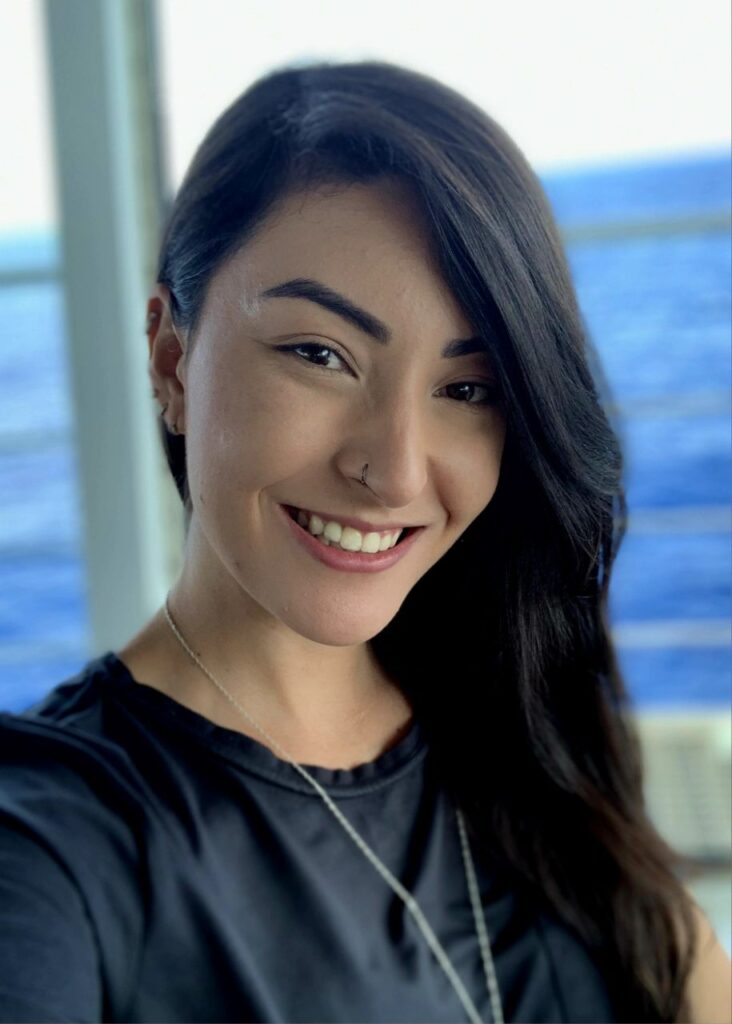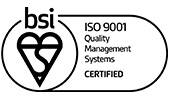Erika Kiemo – Environmental Consultant
Erika is a valued member of our environmental team and is currently gearing up to join a project in Qatar after completing a project in Abu Dhabi. Thank you, Erika, for your continued hard work and for taking the time to give us an insight into your role!
Q: So, what exactly do you do?
I work as an offshore Marine Mammal Observer (MMO) and Passive Acoustic Monitoring (PAM) Operator. In both positions, my main task is to advise and ensure that the environmental laws and guidelines for the resource’s exploration activities are being properly followed.
We carry out active monitoring of the area of operations, applying on-site and real-time mitigation measures designed to minimize the survey’s potential impacts on the marine environment and protected fauna, such as marine mammals, sea turtles and whale sharks.
Q: What does a typical day look like?
Working in two different positions, my day-to-day can vary a little according to the function. In both, we have 12 hours shifts, where when on-site we work every day, and usually joke between our peers that we only have Mondays.
As an MMO, my shifts start at least 15 minutes before the sun rises. Visual monitoring of the area is conducted during daylight hours, equipped with binoculars and camera with zoom lenses. My workplace on a vessel will normally be outside the bridge, where I will be at the highest point and have clear visibility around the vessel.
Each country and project follow their own parameters, therefore having its own mitigation area, which normally varies between 500 to 1000 metres. Vessel-based MMOs will record the numbers and species of protected animals observed in the area, describe their behaviour, distance from the vessel and sound sources, and any observable reaction of them to the survey. Depending on the situation, and proximity of the animals from the sound sources (if inside or not of the mitigation zone), a mitigation action can be required by radio, such as a delay or a break in the activities until the area is clear.
Additionally, as a dedicated MMO, I ensure that all the required procedures are carried out and complied with by the crew, collecting daily data on all the times and environmental parameters during permitted activities, changes in the status of the sound sources, coordinates, and other relevant information depending on the project. With that data, periodical reports are written and sent according to the client’s requests.
In lots of countries, it’s mandatory to have an acoustic monitoring program onboard, for night-time operations or bad visibility conditions and that’s a PAM Operator’s responsibility. Just like the MMOs, as a PAM Operator, I work 12 hours a day but start 15 minutes before sunset, recording survey activity and applying mitigation actions when necessary.
My workplace is normally in an acquisition or instrument room, where I’m close to the navigation crew, and I can keep clear communication in case a mitigation action is required or an operational issue arises.
We call it Passive Acoustic Monitoring because, although we are actively monitoring, we are not making additional noise such as a sonar for example. To keep the monitoring, acoustically detect, and record the species (normally cetaceans and other marine mammals) the PAM Operator will deploy a hydrophone array that will record the vocalizations in an analogical form and that sound will be converted on the PAM system/computer to a digital sound, to be able to listen and read that in form of graphics. So, when working as PAM Op. I am always in front of the screens looking at graphics and using headphones to listen to the vocalizations. To some extent, the PAM Operator will localize those calls when having an acoustic detection, estimate the distance of the animals from the sound sources, and the size of the groups and then decide what actions to be taken. The role of a PAM Operator is basically the same as an MMO, but additionally, I need to have the knowledge to operate, maintain and troubleshoot the acoustic equipment in use.
Q: What do you love about your job?
What I love the most about my job is the constant contact that I have with nature. The peace and freedom of looking at the endless blue, when the ocean and sky are together on the horizon are really good. Every sighting and detection is different, and for me, even the most boring ones make me emotional. It’s always an “awe” kind of feeling. Also, travelling around the different project locations brings me the possibility to experience different cultures and meet new places.
Q: What are the most important attributes for the role?
The most important ones that I would list are:
- Knowledge of species ID and behaviour;
- Familiarization with bioacoustics and marine mammals’ signatures;
- Good communication skills to convey information precisely;
- Teamwork as you will be working directly or indirectly with the people on and offshore;
- Be organized as we are always recording a big amount of data at the same time;
- Be focused and able to work under pressure, as we work long shifts and issues can arise;
- Be able to use a computer and software for statistics, GIS and acoustic analysis;
- Have a mindset that you will need to stay long periods away from home, and miss special dates, holidays, and loved ones.
Q: What do you like and dislike about working offshore?
What I like is that I am at the sea, having contact with different cultures and being able to have different sightings and detections daily.
The hardest part is that I am far from my loved ones and am always at my workplace, even when we have good welfare onboard it can become stressful on long trips.
Q: Do you have any sports and hobbies outside of work?
Other than reading, and being with friends I am currently working on my running, and photography skills. Not sure if it can be counted as a hobby though.
Q: Do you have any advice for anyone wanting to get in to this line of work?
The offshore and marine mammal world is highly competitive, as are other jobs for sure, so if you are seeking to get into this line of work, I advise you to constantly gain knowledge in the area. More than just technical skills, try to improve your interpersonal skills too. Make sure to do your research and try to talk to someone that is already in the industry to see what it looks like and if that’s really what you want. The idea of working with the megafauna is attractive but being long periods offshore can be stressful or even depressing if you are not mentally prepared to, and doing something you love.
We would love to hear from any environmental professionals who would be interested in registering with EMS Assist for future opportunities – please get in touch at the following email address:
Thank you!
The EMS Team


